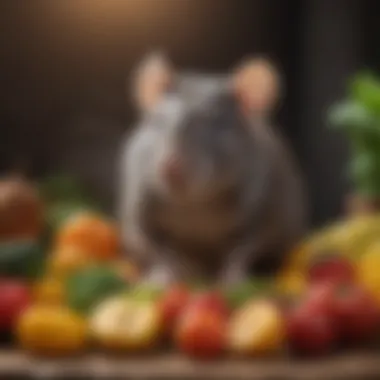Nutritious Treats for Happy and Healthy Pet Rats


Intro
Understanding what your pet rat needs is crucial for their health and happiness. Rats are intelligent creatures that require a balanced diet to thrive. Treats can enhance their well-being and provide opportunities for bonding. However, it is essential to choose treats wisely. This section will dive into understanding your pet, focusing on their behavior, dietary needs, and how to nourish them effectively.
Understanding Your Pet
Pet Behavior Basics
Rats are social animals. They thrive on interaction with other rats and humans. Understanding their behaviors helps in choosing the right treats. Common behaviors include climbing, burrowing, and exploring. Recognizing these behaviors will help you understand what treats might excite them.
Common Breed Characteristics
Not all rats are the same. Different breeds can exhibit different traits. For example, Dumbo rats are known for their friendly temperament, whereas Rex rats may be more playful and curious. Knowing your rat's breed can guide you in selecting appropriate treats that resonate with their personality.
Species-Specific Needs
Rats have specific dietary needs. They require a balanced mix of proteins, carbohydrates, and fats. When considering treats, it’s vital to ensure they are low in sugar and avoid unhealthy additives. Opting for whole foods like vegetables, fruits, and specially formulated rat treats can be beneficial.
Nourishing Treat Options
Natural Treats
Natural treats can be a great addition to your rat's diet. Fruits like apples, bananas, and strawberries are excellent choices. They provide vitamins and minerals. Always wash fruits thoroughly and remove seeds, which can be harmful.
Commercial Treats
Many brands offer commercially prepared rat treats. Look for products that highlight natural ingredients. Some good options include Oxbow Animal Health Chinchilla and Rat Treats. These products often include nutritional benefits that support overall wellness.
Make sure any treat you offer is small enough to avoid choking hazards for your pet rat.
Homemade Treats
Creating treats at home is another option. You could bake oatmeal cookies suitable for rats using simple ingredients like oats, mashed bananas, and a bit of water. This method allows you to control ingredients and avoid preservatives.
Considerations for Treats
- Moderation: Treats should complement a rat's regular food, not replace it.
- Variety: Offering a range of treats can keep your rat interested and excited about their diet.
- Observation: Pay attention to how your pet reacts to different treats. If they seem to dislike or react negatively, discontinue use immediately.
Final Thoughts
Choosing the right treats for your pet rat is fundamental to their health. By understanding their behavior, breed characteristics, and specific needs, you can make informed decisions. Natural options, commercial products, and homemade treats all have their place in a rat's diet. With careful consideration, treats can enhance the quality of life for your furry friend.
Understanding Rat Nutrition
Understanding nutrition is fundamental for maintaining the health of pet rats. These small rodents have specific dietary needs that, when met, can lead to longer, happier lives. Rats are omnivores, which means they eat a variety of foods, including grains, fruits, vegetables, and proteins. A well-rounded diet is not just a luxury; it is essential for growth, energy, and overall well-being.
Essential Nutrients for Rats
Rats require various nutrients to thrive. Some of the key elements include:
- Proteins: Vital for growth and repair of tissues. Good sources are boiled eggs or small amounts of lean meat.
- Fats: Necessary for energy and healthy skin. A small amount of seeds can provide healthy fats.
- Carbohydrates: Mainly sourced from grains, they supply energy for daily activities.
- Vitamins and Minerals: Essential for several bodily functions. Fresh vegetables and fruits contribute to this need.
Different age groups and health conditions can influence the specific requirements. Therefore, it is prudent for pet owners to consult a veterinarian for tailored advice.
The Role of Treats in a Rat's Diet
Treats can serve numerous purposes in a rat's diet. While they are not a staple, they play an essential role in encouraging social interaction and mental stimulation. Treats can also be a tool for bonding, as they create opportunities for positive engagement between owners and their pets.


However, treats should be carefully chosen. They must complement a rat's main diet and not be a substitute. Regularly offering the same types of treats can lead to nutritional imbalances. Thus, variety should be maintained. Treats best serve their purpose when they are healthy and given in moderation. This not only enhances a rat's diet but also contributes to its psychological well-being.
Key Takeaway: Proper nutrition is crucial for rat health, and treats should enhance rather than replace a balanced diet.
Criteria for Selecting Treats
Choosing appropriate treats for pet rats requires careful consideration. The right choices can provide nutrition, enrichment, and motivation for good behavior. This section explores essential elements that influence the selection process, focusing on nutritional value and safety. Paying attention to these factors helps ensure that treats positively impact a rat's health and well-being.
Nutritional Value Assessment
When assessing treats, nutritional value should be the foremost concern. Rats, while small, have specific dietary needs essential for their growth and overall health. Treats should offer beneficial nutrients rather than merely empty calories. Always look for treats that are high in protein and fiber. Good options include small amounts of cooked grains, legumes, or specially formulated rat treats that have balanced ingredients. Here are key points to consider regarding nutritional value:
- Protein Content: Protein is crucial for muscle development and overall health. Opt for treats with a significant protein content.
- Fiber Sources: A diet rich in fiber promotes digestive health. Include high-fiber ingredients like whole grains or oats in the treat selection.
- Vitamins and Minerals: Essential vitamins and minerals support various body functions. Ensure treats contain necessary nutrients found in fruits and vegetables.
Focusing on the nutritional aspect does not only satisfy the immediate craving for treats; it contributes to the long-term health of the rats.
Safety Considerations
Safety is another critical consideration in treat selection. Not all foods that humans consume are appropriate for rats. Some items can be toxic or cause health issues. Always avoid giving treats that contain artificial additives, preservatives, or excessive sugar. In addition to this, be aware of common toxic foods for rats. Below is a brief list of items that should be strictly avoided:
- Chocolate
- Caffeine (found in coffee and tea)
- Certain fruits, such as grapes and raisins
- Raw beans (toxic properties)
In contrast, safe treat choices should be made from whole foods. When introducing any new treat, do it gradually to monitor for any adverse reactions. Consult with a veterinarian if unsure about certain foods. This approach ensures safety and contributes to a healthier diet.
Important: Always prioritize treats that promote well-being. The health and happiness of your pet depend on the wise choices you make in their diet.
By evaluating both the nutritional value and safety of treats, pet owners can confidently enhance their rats' diets while providing enjoyable snacking options.
Best Treat Options for Rats
The selection of treats for your pet rat is a significant aspect of their diet. Treats not only serve as occasional rewards but also contribute to the overall health and happiness of these animals. Choosing suitable options requires awareness of their nutritional needs and safe consumption. Few key points about this section include balancing food intake and introducing variety into their diet, while also considering both store-bought and homemade alternatives.
Fruits and Vegetables
Recommended Varieties
Fruits and vegetables are essential additions to a rat's diet. They provide valuable vitamins and minerals, which can boost immunity and enhance health. Common options include apples, blueberries, broccoli, and carrots. These varieties stand out due to their high fiber content and low fat, making them excellent choices. Moreover, rats enjoy chewing on fresh produce, which also helps with dental health by preventing overgrowth of their teeth.
However, some fruits and veggies must be offered in moderation. For example, grapes can be good but should not be a primary food due to potential high sugar content. Therefore, it's crucial to rotate options and maintain a balanced approach to avoid excess consumption.
Preparation Tips
How you prepare fruits and vegetables affects their safety and enjoyment. Washing produce thoroughly removes pesticides and dirt. It is also wise to chop items into smaller pieces, making them easier for rats to handle. Rather than offering whole fruits, consider cutting them, as this can stimulate your pet's interest in trying new textures.
You should avoid cooking certain veggies, as exposure to heat can diminish vital nutrients, which rats need. Offering raw is often best. Still, if you choose to steam some vegetables lightly, it can enhance sweetness without significant nutrient loss.
Commercial Rat Treats
Factors to Consider
When looking for commercial treats, several factors come into play. First, read the ingredient list carefully. High-quality products typically contain whole ingredients rather than fillers or artificial additives. Also, look for treats fortified with vitamins specifically beneficial for rats, such as Vitamin C. This ensures that your rat is not only enjoying a flavorful snack but also receiving health advantages. Additionally, always check for clear expiration dates to ensure freshness and quality.
Safety testing standards are vital in choosing reliable brands. A treat might look appealing, but if it lacks quality assurance, it can pose risks.
Brands to Explore
There are well-known brands that specialize in rat treats, including Oxbow, Kaytee, and Tiny Friends Farm. These brands focus on creating healthy options that align with the specific dietary needs of rodents. They often offer variations like baked snacks or dried fruits, which can be appealing for even picky eaters. By exploring these brands, you can ensure that you provide treats that not only please your rat's palate but also fit within a nutritious framework.
Homemade Treat Recipes


Simple Ingredients
Creating homemade treats can be a rewarding option for pet owners. Using simple ingredients such as oats, peanut butter, and whole grains allows you to have control over what goes into your rat's snacks. These choices can be much healthier than many commercial alternatives. Besides, homemade treats can cater to specific dietary needs, ensuring that no harmful substances are included. On a practical note, these ingredients are usually affordable and easy to source, facilitating regular treat preparation.
Cooking Methods
There are a few methods to create tasty homemade treats for your rats. Baking is one common approach; a simple recipe can include oats mixed with mashed banana, which can then be spooned out on a baking sheet and baked until set. Alternatively, no-bake recipes often consist of blending peanut butter with oats and shaping into small balls, which can be refrigerated to firm up. These methods maintain the integrity of the ingredients and offer a straightforward way to provide healthy snacks.
However, it is important to balance homemade treat giving so that they do not become the mainstay of your rat's diet. Portion control must be considered when making these treats in bulk.
Innovative Treat Ideas
Innovative treat ideas are essential in enriching the lives of pet rats. These concepts not only provide nutrition but also stimulate their minds and help maintain their physical health. Rats are intelligent creatures that thrive on mental stimulation; thus, the treats should encourage exploration and interaction. Offering a variety of treats enhances their experience, making feeding time a fun and engaging activity.
Interactive Treats for Mental Stimulation
Interactive treats are excellent tools for enhancing a rat's mental abilities. These treats can take the form of puzzle toys filled with small food rewards or hidden treats within a larger treat. Not only do they occupy their time, but they also stimulate their natural foraging instincts. Engaging them this way helps reduce boredom and promotes physical activity.
- Examples of Interactive Treats:
- Foraging Balls: These are hollow balls that hold treats inside. Rats must roll the ball around to get the food out.
- Puzzle Feeders: These feeders have compartments that rats need to unlock to access their treats, adding a level of challenge.
Using interactive treats can lead to longer play sessions and enhance the bond between pet and owner. It is critical to monitor the difficulty levels to ensure that the rats do not get frustrated but instead feel accomplished.
Seasonal and Special Occasion Treats
Seasonal and special occasion treats are a wonderful way to celebrate the unique moments in life with your pet rat. These treats can mark holidays or just be a way to show appreciation for your pet. It is important to ensure that these treats remain healthy and safe, despite being special or celebratory in nature.
- Ideas for Seasonal Treats:
- Special Occasion Suggestions:
- Pumpkin Treats for Halloween: Pureed pumpkin can be mixed into treats, making them festive and nutritious.
- Holiday Cookies: Use a rat-friendly recipe to create small cookies shaped like holiday symbols.
- Birthday Treats: Celebrate your rat's birthday with freshly made fruit purees or small, safe cakes.
- Introducing New Flavors: Try introducing new fruits or vegetables during special occasions to keep things exciting.
These treats provide a means to celebrate the unique companionship of pet rats while maintaining their healthy eating habits. It is feasible to use special occasions as opportunities to explore new flavors within safe boundaries.
Moderation and Balance in Treat Giving
Providing treats to your pet rat can enhance their diet and serve as an enjoyable experience for both the owner and the animal. However, it is vital to ensure moderation and balance in this practice. Treats should not overshadow the primary diet of high-quality rat pellets, fresh fruits, and vegetables. An excess of treats can lead to obesity and other health issues. Rat owners must understand the significance of limiting treat quantities and maintaining nutritional diversity.
Moderation means offering treats in limited amounts, while balance refers to the mix of different types of treats available to your pet. Both concepts are crucial in ensuring that your rat remains healthy and happy. The careful integration of treats can support training and bonding while fostering a pet’s overall well-being.
Guidelines for Treat Quantity
When considering how many treats to give your rat, certain guidelines should be followed. First, the general rule is that treats should make up no more than 10% of your rat's daily caloric intake. This helps maintain a proper diet, ensuring that your pet receives essential nutrients from their main food sources.
Some pointers include:
- Frequency: Treats can be given a few times a week, depending on your rat's size and activity level.
- Portion Size: Ensure that the portions are small. For instance, a small piece of fruit or a single pellet can suffice.
- Monitoring Health: Keep an eye on your rat's weight and overall health. If you notice any weight gain, consider reducing treat amounts.
By adhering to these guidelines, you can provide delightful rewards while keeping your pet’s health in check.
Balanced Diet Considerations
A balanced diet is crucial for the well-being of your rat. While treats are enjoyable, they should not replace the essential nutrients found in their core diet. The primary focus should be on providing a mix of proteins, carbohydrates, fats, vitamins, and minerals. Rat pellets should form the backbone of their diet, supplemented by safe fruits and vegetables.
Key considerations for a balanced diet include:
- Diversity of Foods: Different types of food can provide a range of nutrients. Include various safe fruits and vegetables such as carrots, pumpkin, and blueberries.
- Avoiding Processed Treats: Many commercial treats contain artificial additives and sugars. Instead, look for healthier options or consider making your own treats at home.
- Hydration: Always ensure your rat has access to fresh water. Some treats can lead to dehydration if not balanced with sufficient liquids.


In summary, moderation and balance in treat giving are essential for the health and happiness of your pet rat. This approach not only allows for enjoyable experiences but also helps in maintaining a healthy lifestyle.
Potential Risks of Certain Treats
Understanding the potential risks associated with certain treats is crucial for the health and well-being of pet rats. While treats can offer enrichment and excitement in a rat's diet, they can also pose serious health threats if not carefully selected. Awareness of these risks allows pet owners to make informed decisions and ensure that their rats receive safe and nutritious options. By focusing on the risks of common toxic foods and the health issues related to overfeeding, this section highlights the importance of a prudent approach when offering treats.
Common Toxic Foods
Rats, like other pets, can be susceptible to certain foods that may not only harm them but can also be fatal. As responsible pet owners, it is important to know which foods to avoid. Some common toxic foods include:
- Chocolate: Contains theobromine, which is harmful to rats.
- Onions and Garlic: These can cause damage to red blood cells, leading to anemia.
- Citrus Fruits: While small amounts may not harm, excessive consumption can lead to stomach upset.
- Raw Potatoes and Green Potato Skins: These contain solanine, which is toxic.
- Avocado: Contains persin, which can cause respiratory distress.
- Alcohol and Caffeine: These substances can result in severe health outcomes and should be strictly avoided.
It is critical to keep these toxic foods out of reach, as rats are curious by nature and may accidentally ingest them while exploring.
To further protect your pet, regularly assess their food environment for any hazards. Be mindful of any chewing that might lead to ingesting toxic items. Educating yourself on the known toxic foods is a foundational part of keeping your pet rat safe.
Health Issues Related to Overfeeding
Overfeeding is a common but avoidable mistake that pet owners can make. Treats, while they are enjoyable for rats, should be provided in moderation. Excessive intake can lead to several health complications such as:
- Obesity: Just like humans, rats can become overweight. Obesity can cause mobility issues and may limit their activity.
- Diabetes: High sugar intake can lead to insulin resistance, resulting in diabetes.
- Digestive Issues: A high amount of treats can disrupt a rat's digestive system, leading to discomfort and potential illnesses.
- Dental Problems: Chewing too many sugary treats can result in dental decay, which is critical for their overall health.
A balanced approach is essential for maintaining your rat's health. Aim to incorporate treats as a small part of a well-rounded diet, ensuring that their primary nutrition comes from high-quality rat pellets and fresh foods.
By being cognizant of both toxic foods and the risks associated with overfeeding, pet owners can enhance their rats' quality of life while avoiding potential health hazards.
The Importance of Variety in Treats
Offering a variety of treats is crucial for the well-being of pet rats. Rats, being highly intelligent creatures, thrive on stimulation. A diverse treat selection encourages them to explore different tastes and textures. This variety can contribute significantly to their physical and mental health.
When rats experience a range of flavors, they are more likely to engage in natural behaviors such as foraging. Diverse treats can help mimic their natural diet, which is not only enriching but also beneficial for their overall development. Moreover, it can enhance their learning experiences, as they associate different tastes with various positive behaviors and rewards.
Encouraging Exploration and Curiosity
Rats are naturally curious animals. They have an instinctual need to investigate new items around them. Providing various treats can stimulate this desire to explore. For instance, rotating the types of treats offered can keep the environment dynamic and engaging.
Incorporating novel foods such as cooked sweet potatoes or small pieces of cheese can spark interest. As rats interact with different treats, they often discover new preferences. This exploration is not just fun for the rats; it is essential for their psychological health.
Preventing Food Boredom
Food boredom can lead to undesirable behaviors in rats. When they have the same treats repeatedly, they may lose interest in eating or seek entertainment in other forms. This can affect their appetite and overall health negatively.
To prevent this, introduce new treats regularly. Even simple changes—like varying the shape or size of fruits and vegetables—can make a significant difference. Instead of offering the same carrot slices every day, try offering them in different forms, such as shredded or whole.
By ensuring variety, rats will remain excited about mealtime. Treat time should be an anticipated event, not a monotonous chore.
Ending: Making Informed Choices
Understanding how to select appropriate treats for your pet rat is vital for their health and happiness. This article emphasizes the significance of providing treats that meet their nutritional needs while ensuring safety. Making informed choices allows pet owners to enhance their rats' well-being through balanced diets, enjoyable experiences, and variations in their treat selection.
Informed treat selection fosters a stronger bond between you and your pet rat, as it reflects your commitment to their health.
The Role of Research in Treat Selection
Researching the best treats for your rat is crucial for ensuring their dietary needs are met. Different rat species may have varying nutritional requirements. It is advisable to explore academic papers or reputable websites dedicated to rodent care. Consulting veternarians for their recommendations on specific brands or homemade recipes can also be beneficial. This way, you can make confident decisions that prioritize your rat's health.
Additionally, staying up-to-date with current studies on rat nutrition helps you understand the impact of certain ingredients. Research equips you to discern which slow-release treats are beneficial and which should be avoided.
Creating a Balanced Treat Menu for Your Rat
Crafting a balanced treat menu involves considering both variety and moderation. Ensure you incorporate a mixture of fresh fruits, vegetables, and safe commercial options. Be mindful of the proportion of treats relative to their regular diet. A ratio of about 10% treats to 90% regular food is typically advisable.
Consider the following when you create a treat menu:
- Variety: Include different types of fruits and vegetables. Each offers unique benefits.
- Quality: Use fresh, organic produce when possible to avoid harmful pesticides.
- Preparation: Some treats may require cooking or special preparation, ensuring they are easy to consume and digest for your rat.







